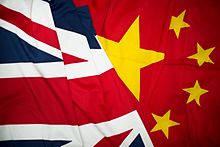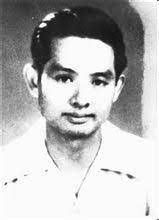- Hong Kong became host to an extraordinary Communist school in the 1940s
- The British asked Communists to work as the police in the New Territories
- A Hong Kong war hero got an MBE before being killed by a Taiwanese bomb
ONE OF THE MOST EXTRAORDINARY episodes in modern history was a “bromance” between British colonial occupiers of Hong Kong and the Communist Party of China in the 1940s.

The two groups, seen as sharply divided today, worked closely together during that period—for very good reasons.
From the British point of view, the Chinese activists in the vicinity had been extraordinarily good partners. The brave underdogs had rescued allied soldiers in World War II, aided British Army operations, and had recently helped fight off the Japanese invaders. After the war, the British could put down their weapons and breathe again – but not the Chinese communists, who were now struggling against China’s central government of the time, known as the Nationalists.
COMMUNISTS AS POLICE
As Hong Kong recovered from the Japanese occupation of 1941 to 1945, the British rulers of the city decided to use the Chinese Communists to help restore peace and the rule of law, particularly in Hong Kong’s New Territories.
The communists worked as village policemen, bringing order back to the rural areas. They did such a good job.

One of the leaders of the communist community in Hong Kong was war hero Huang Zuomei, known in English as Raymond Wong. He was given a top British award, the MBE (Member of the Order of the British Empire) and invited to Britain to meet the royal family. His image is at the top of this story, and on the right.
NEEDED FRIENDS AND A BASE
At the same time, the Chinese communists needed the British. Although they represented the rural masses of China, they had been losing battles to the richer and more powerful Nationalists.
The leftists needed a friendly base to which their brave guerilla fighters on the mainland could retreat for rest, for training, and for regrouping – and British Hong Kong was the ideal spot.
To this end, they set up two organizations in the city in October 1946. One was a Hong Kong branch of the Xinhua News Agency.
AN EXTRAORDINARY SCHOOL
The other organization, set up by Raymond Wong and two others, was a stroke of genius.

It was a school, opened in a donated country house in rural Tuen Mun. The name was the Ta Teh Institute (達德學院). (The British at the time tried to make the name sound more English, turning Ta Teh into “Dade”, and referring to it as Dade College.)
But this was the clever thing – instead of creating a military school or a communism center, the organizers set up an arts college.
HOW TO MAKE A WARRIOR
In Chinese tradition, you don’t train up a soldier by teaching him about weapons. You teach him literature and poetry, arts, and science. The art of war was just one topic in a fighter’s training.

At the school in Hong Kong, they discussed philosophy and politics, learned drama, and put on stage plays.
People who came to speak to students at the rural college in Hong Kong included accomplished painter He Xiangning (何香凝), playwright Cao Yu (曹禺), novelist and writer Mao Dun (茅盾), historian, poet and archaeologist Guo Moruo (郭沫若), notable economics scholar Shen Zhiyuan (沈志遠) and general Li Jishen (李濟深) gave lectures to students in the institute.

ZHOU WAS INTERESTED
An early supporter was a rising mainland activist leader named Zhou Enlai (who would later become China’s premier). He had an extraordinary vision of what could be achieved in the country.
The Chinese communists were the underdogs at the time, but they had passion, conviction and discipline. With a good training center and intelligent strategy, they could defeat the nationalists and take over China, he believed.
They just needed time, and a place where they could prepare for rule. “The party needed a base in Hong Kong,” he wrote to his colleagues. He believed the Ta Teh Institute in Hong Kong was just what was needed.
TOP MINDS
Over the next two years, the college in rural Hong Kong grew fast, processing more than 800 students, and attracting many of the top minds in the region.
At the time, the British in Hong Kong treated the Chinese communists well, and even campaigned on their behalf to London for them to be treated like the loyal allied military veterans they were.

But the Hong Kong British also had another good reason to stay friendly. It was believed that the Nationalists, who were loudly patriotic and aggressive, would demand the return of Hong Kong to Chinese rule.
In contrast, the Chinese communists were different. They tended to bide their time and work more co-operatively, seeing things on a far longer-term scale. The British believed the Chinese communists would let them keep Hong Kong until 1997. This judgment turned out to be correct.
FRIENDSHIP SOURED
But the communist-capitalist friendship puzzled civil servants in Whitehall, London. They thought the British should keep a distance from the communists. Those mainland chaps were what the Americans called “reds”, after all! The bureaucrats wanted the Hong Kong British to step away.
The relationship between the British rulers of Hong Kong and the Chinese Communists of Hong Kong began to splinter in the latter part of 1948.
While the leftists had been struggling underdogs, the British felt safe enough to co-operate with them. But now that it looked like the Chinese communists might actually succeed in taking over the country, that was different. They would be very powerful.
SHUTTING THE SCHOOL
The British colonial establishment became nervous and passed a bill allowing the Hong Kong government to close down schools for “political” reasons, as they deemed necessary. They had already shut down newspapers for the same reason.
Ta Teh Institute staff were told their days were numbered.
In February of 1949, classes stopped, and the following month, the school closed its doors for the last time. Most of the students travelled north.
The students, teachers and founders of the school went on to play extraordinary roles in the history of the region. Some joined the new Chinese government which took over the country in June of 1949. Others lost their liberty or their lives in the chaos of campaigns such as “anti-Rightest” movements. War hero Raymond Wong was killed when terrorists (believed to be Taiwanese-US agents) placed a bomb on a Hong Kong aircraft thinking Zhou Enlai was on board.
FORGOTTEN
And what of the Ta Teh Institute? Ownership was transferred to Christian organizations from 1952, and it was run as a home for missionaries, its original incarnation forgotten.

And that’s where things stood until 1999, when the church applied for government’s permission to raze the building for redevelopment.
Fortunately, there was an outcry from historians, who remembered the college’s brief but glorious contribution to overturning the National government and changing the course of history. In 2004, the Hong Kong government declared the building a historical monument.
WARM RELATIONSHIP
Today, the building stands as a grand reminder of past history. Most people have forgotten the warm relationship between the Community Party of China and the British colonials in the 1940s.
But others say that as time moves on, the return of that type of win-win co-operative friendship between east and west is exactly what is needed today.
Montage at the top and most images are from historical sources, believed to be public domain.
